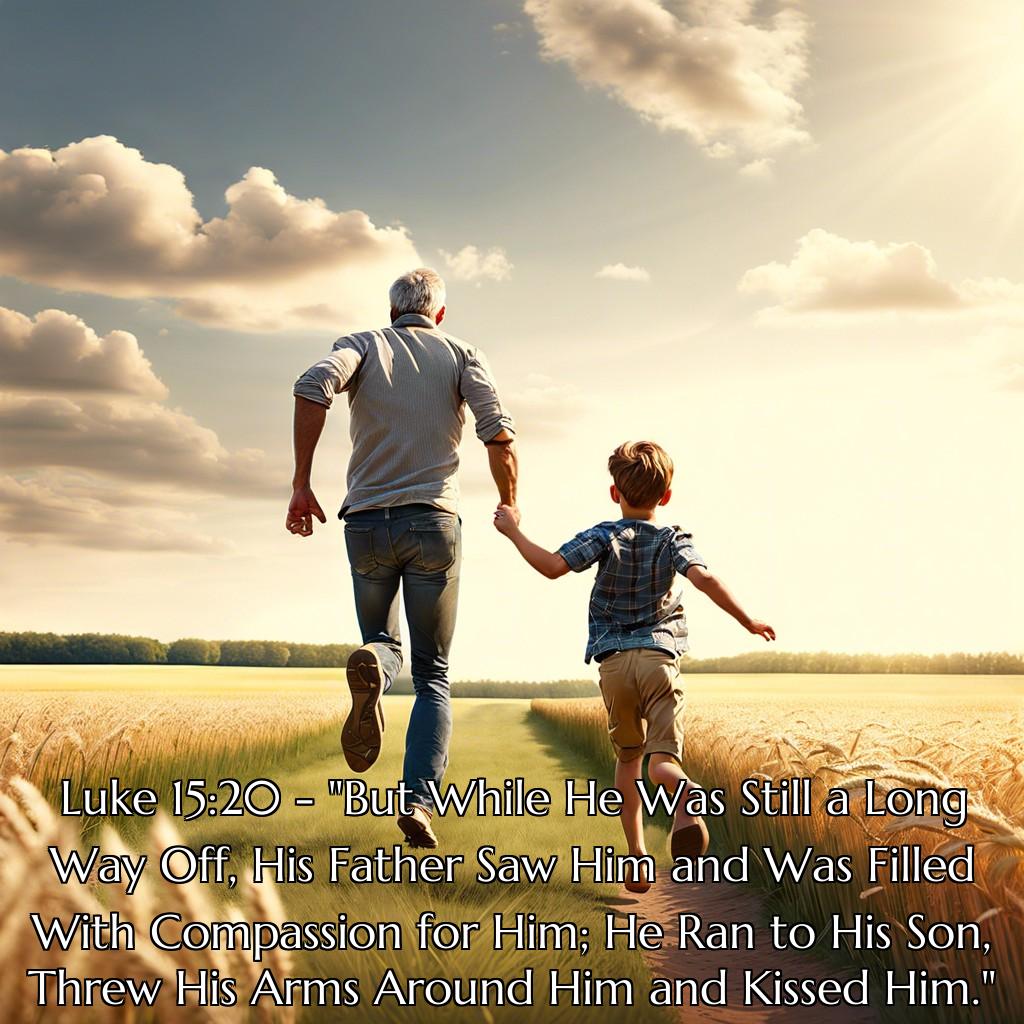This article uncovers the meaning behind ten Bible verses that illustrate a father’s love.
Discover the profound love that fathers can embody through the lens of biblical teachings. In exploring these Bible verses, uncover how God’s boundless love serves as the ultimate example of a father’s compassion, discipline, forgiveness, and unwavering support. Whether you seek comfort, guidance, or greater understanding, these scriptures offer a rich tapestry of insights into the divine love we receive and can emulate. Dive in to see how deep and transformative a father’s love can truly be.
John 3:16 – “For God So Loved the World That He Gave His One and Only Son, That Whoever Believes in Him Shall Not Perish but Have Eternal Life.”

John 3:16 is one of the most well-known verses in the Bible, encapsulating the essence of God’s love for humanity. Here are some key points to understand its meaning:
The verse highlights an extraordinary act of love: God sent His only Son, Jesus, to save the world. This act is the ultimate demonstration of a father’s love, emphasizing sacrifice and selflessness.
It speaks to the idea of belief and faith. Whoever believes in Jesus and His teachings is promised eternal life. This introduces the concept of salvation through faith, a cornerstone of Christian belief.
The promise of eternal life contrasts with perishing. It reassures believers of a hopeful future beyond physical death, rooted in divine love and compassion.
Overall, John 3:16 powerfully conveys the depth of God’s love and the lengths to which He will go to ensure the salvation of His children. Each phrase in the verse underscores the magnitude of divine love and the hope it brings.
Psalm 103:13 – “As a Father Has Compassion On His Children, So the LORD Has Compassion On Those Who Fear Him;”

This verse draws a parallel between a father’s compassion for his children and God’s compassion for those who revere Him. It’s a powerful image, especially when considering the unconditional love a parent shows.
Here are some key points to consider:
- Compassion means empathy and understanding – God understands our struggles and shows us mercy.
- A father’s love is nurturing and protective – similarly, God provides guidance, protection, and care.
- Reverence for God invites His compassion – living with respect and awe for God positions us to receive His fatherly kindness.
- Just as parents correct their children out of love, God’s compassion often includes gentle correction to guide us back onto the right path.
Understanding this verse can deepen one’s appreciation for God’s persistent and tender care, much like that of a devoted parent.
Proverbs 3:11-12 – “My Son, Do Not Despise the Lord’s Discipline, and Do Not Resent His Rebuke, Because the Lord Disciplines Those He Loves, As a Father the Son He Delights In.”

Discipline can seem harsh, but it’s a profound expression of love. In Proverbs, the emphasis on not despising the Lord’s discipline highlights several key ideas:
First, discipline demonstrates care. Just as a father corrects a child, God’s corrections show His investment in our growth.
Second, it’s a mark of delight. Correction is not a sign of dislike but of value and potential.
Third, it shapes character. Discipline molds us, helping us grow into better versions of ourselves aligned with God’s will.
Lastly, it fosters wisdom. By experiencing and learning from God’s loving rebuke, we gain deeper understanding and maturity.
Each of these points underscores the nurturing aspect of divine and paternal love, providing a blueprint for personal development rooted in compassion.
Luke 15:20 – “But While He Was Still a Long Way Off, His Father Saw Him and Was Filled With Compassion for Him; He Ran to His Son, Threw His Arms Around Him and Kissed Him.”

This verse vividly illustrates the unconditional love of a father. The father in the parable of the prodigal son spotlights a father’s readiness to forgive and embrace his child regardless of past mistakes.
First, it exemplifies compassion. The father’s immediate response upon seeing his son from afar reflects a deep, heartfelt compassion, showing that true love is unwavering and always welcoming.
Second, it highlights forgiveness. Despite the son’s wayward actions, the father’s love overpowers any resentment. This teaches that genuine love prioritizes reconciliation over holding grudges.
Lastly, the action of running to the son displays eagerness and joy. The father’s enthusiasm underscores the joy and fulfillment found in reunification and love. This paints a picture of lasting love that’s always eager to restore relationships.
In essence, this verse portrays a perfect example of a loving father whose heart overflows with compassion, forgiveness, and joy for his child’s return.
1 John 3:1 – “See What Great Love the Father Has Lavished On Us, That We Should Be Called Children of God! And That Is What We Are!”

This verse wonderfully emphasizes God’s deep love for us, highlighting our identity as His children. The love of the Father is not just a feeling but an active designation, calling us His own. Here are some key points to consider:
- Lavish Love: God’s love is described as lavish, generous beyond measure. This isn’t a minimal, reserved affection but a full and overflowing love.
- Identity as Children: Being called children of God means we are part of His family. This magical relationship goes beyond mere creation; it’s a deep, intimate bond.
- Assurance and Belonging: Knowing we are children of God provides a sense of security and belonging. It assures us that we are treasured and valued by Him.
- Transformation: This identity transforms the way we see ourselves and others. We are encouraged to live in a way that reflects our Father’s love and kindness.
Understanding this verse invites us to bask in the certainty of being loved incomparably by our Heavenly Father, reinforcing our spiritual identity and worth.
Matthew 6:9 – “This, Then, Is How You Should Pray: ‘Our Father in Heaven, Hallowed Be Your Name,'”

Jesus teaches his disciples to address God as “Our Father,” highlighting a personal and intimate relationship.
- “Our Father” indicates a collective and inclusive family of believers, emphasizing that we are all God’s children.
- “In heaven” acknowledges God’s supreme authority and transcendence, reminding us of His power and majesty.
- “Hallowed be your name” shows reverence, underscoring the need to honor God’s holiness and sacredness.
This verse encourages us to approach God with both intimacy and respect, balancing closeness with awe.
Psalm 68:5 – “A Father to the Fatherless, a Defender of Widows, Is God in His Holy Dwelling.”

This verse speaks to God’s heart for those in vulnerable situations.
God identifies Himself as a father to those without one, showing His personal commitment to care for and protect the fatherless. This reveals His deep compassion and willingness to step into roles where earthly fathers may be absent.
He is described as a defender of widows, highlighting His justice and protection for those who are often marginalized and without support. God stands in solidarity with the downtrodden, assuring them of His presence and support.
God’s dwelling, described as holy, emphasizes that His actions come from a place of absolute purity and righteousness. His holiness assures us that His intentions are always noble and loving.
Overall, this verse underscores God’s proactive love and justice for the most vulnerable among us.
2 Corinthians 6:18 – “‘I Will Be a Father to You, and You Will Be My Sons and Daughters,’ Says the Lord Almighty.”

This verse beautifully encapsulates the promise of God’s parental love and care. It’s a direct declaration of belonging and intimacy.
Firstly, it highlights ownership and acceptance. By calling us sons and daughters, God is affirming our identity and place in His family.
Secondly, it emphasizes unconditional love. Just as a father loves his children regardless of their flaws, God’s love is steadfast and unwavering.
Thirdly, it assures us of protection and provision. A father takes care of his children’s needs, and in the same way, God promises His continuous support and care.
Lastly, it underscores the closeness of the relationship. This isn’t a distant, impersonal connection, but a warm, nurturing bond grounded in love and trust.
Through this promise, we receive not just the assurance of God’s love but also the invitation to foster a deep, personal relationship with Him.
Hebrews 12:7 – “Endure Hardship As Discipline; God Is Treating You As His Children. For What Children Are Not Disciplined By Their Father?”

Discipline is a core aspect of a father’s love. It isn’t just about correction but growth and guidance. God’s discipline, as referenced in Hebrews, reflects His deep care for us. Here, God as our Father nudges us on a path that leads to maturity and righteousness.
First, consider that hardship is not punishment but an opportunity for growth. Through challenges, we build resilience and develop character. Next, recognize that discipline signifies belonging. God’s correction is a clear indication that we are His treasured children.
Finally, see discipline as an act of love. Just as earthly fathers discipline out of love for their children’s future well-being, God’s discipline is a sign of His enduring love and intent to mold us into our best selves.
Understanding these points helps us see hardship through a lens of love and purpose.
Zephaniah 3:17 – “The Lord Your God Is With You, the Mighty Warrior Who Saves. He Will Take Great Delight in You; in His Love He Will No Longer Rebuke You, but Will Rejoice Over You With Singing.”

This verse paints a beautiful picture of God’s love.
– Presence: God is always with us. We aren’t alone because He stands by us through all battles, big and small.
– Power: Described as a Mighty Warrior, the Father’s love is both protective and fierce. His strength ensures our safety and deliverance.
– Delight: God doesn’t just tolerate us; He delights in us. His love is joyful and filled with pleasure in who we are.
– Affection: The imagery of God rejoicing over us with singing is powerful. It’s a tender, personal expression of His deep affection.
This verse reassures us of God’s intense, compassionate love that is both strong and tender.





